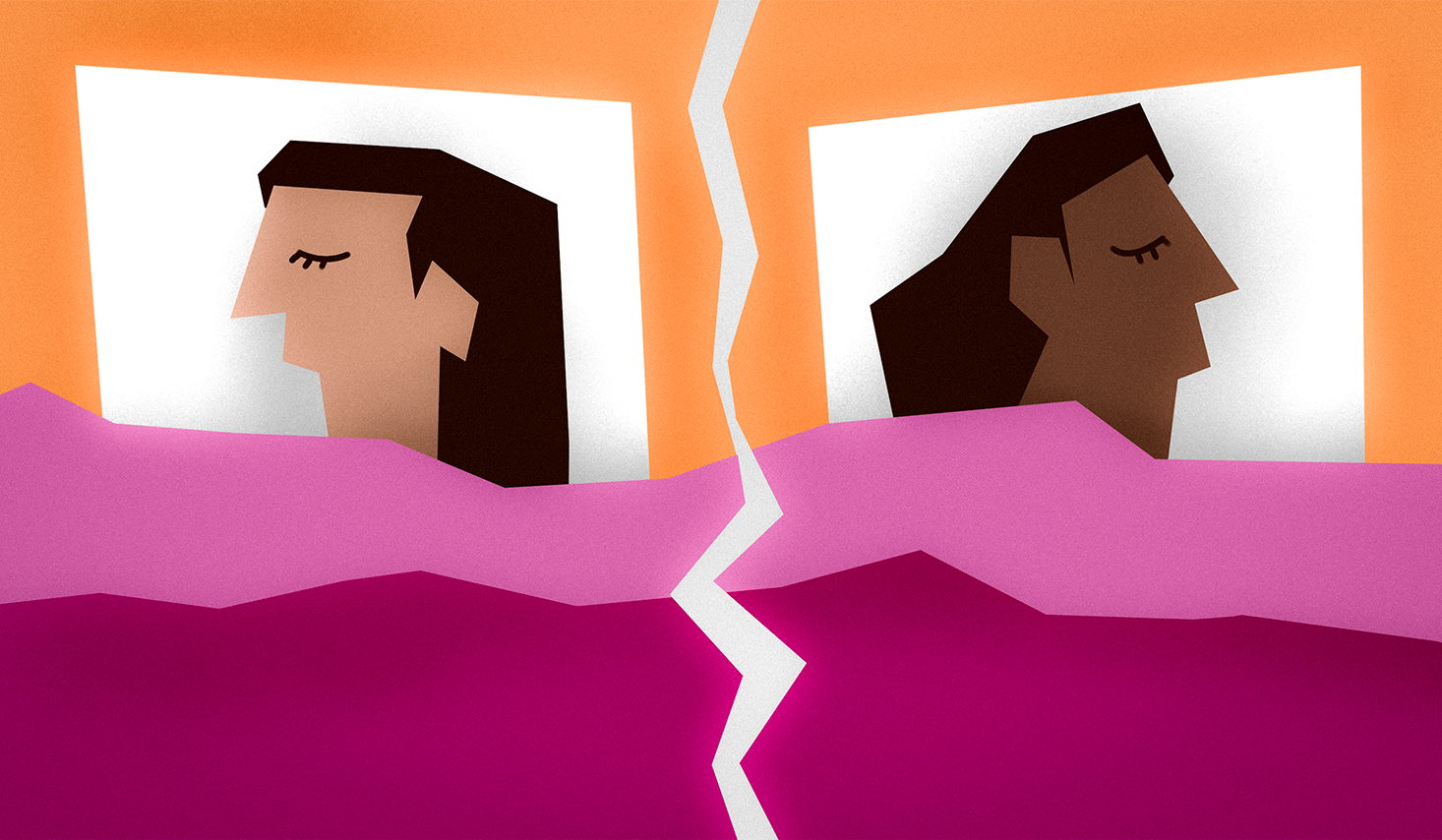
If you, like me, heard the phrase ‘Lesbian Bed Death’ and jumped to all kinds of horny interpretations of the term, then I would like you to stop reading this article right now. It is much more fun to imagine Lesbian Bed Death as a promise to shag everywhere but between the sheets. Maybe it could even be a sequel to Death Proof, arguably the best Tarantino film if you like girls, stunts and revenge – which the common GAY TIMES reader certainly does. Unfortunately, dear reader, the opposite is true Lesbian Bed Death refers to a diminished or completely devoid sex life between two women in a long-term relationship.
The term originated in 1987, because of the studies done by social psychologist Philip Blumstein and sociologist Pepper Schwartz that suggested that lesbian couples engaged in less sexual activity compared to those in heterosexual relationships, Angelika Koch – the relationship and breakup expert for LGBTQIA+ dating app Taimi – tells me. But sex stagnating after a certain number of years sounds like an inevitability for any committed couple after a few years – what makes it so different when it occurs to queer women?
Frances*, a 30-year-old insurance agent who is currently undergoing a bout of bed death, qualifies this stereotype as separate to poor sex lives in other kinds of relationships. She explains: “For hetero couples, there’s this expectation that dry spells will happen but, because so many people view gay couples with a lens of perverse sexuality, there’s an expectation of hedonism and constant sexual pleasure.” She continues, “Essentially, life gets in the way. I think most couples face this but for queer women, it holds a greater stigma to not engage in sex. In a relationship with two women, it can be seen as a failure when it’s just something that happens in most couples. I also feel that women are better at understanding that their partner’s bodies are not merely there for sexual consumption so the pressure to have sex a prescriptive amount of times is not there the same way as it can be for hetero couples.”
23-year-old Suzanne* agrees with Frances’ assessment, adding that “There’s this reputation that queer women/lesbians have about having loads of really great long sex all the time – which I think makes it harder to talk about ‘dry spells’ and also adds a sense of pressure that other couples don’t experience.” Report after report comes out almost annually exposing lesbians as having the best sex out of all, with statistics confirming women in homosexual pairings have the most orgasms during their sexcapades compared to any other kind of coupling.
However, Suzanne also attributes the singularity of the Lesbian Bed Death stereotype to the specifically intimate nature of sapphic relationships, noting “the emotional charge is a huge element of wlw sex, so I’d say the ‘blow’ hits harder when one person in the relationship feels sexually ‘rejected’.”
The story only gets sadder from here folks, as Lesbian Bed Death isn’t taken as seriously as you may expect by others in the queer community. Almost all of the people I interviewed for this feature commented on the pressure of the stereotype on their relationships when experiencing a lack of sex in their romantic relationships. Josephine*, a 31-year-old project manager who found Lesbian Bed Death to be the “butt of jokes” in the queer circles she has run in.
Josephine continues, “It’s embarrassing to admit that your relationship has fallen victim to Lesbian Bed Death, which I think silences people because they feel ashamed to almost perpetuate that stereotype. I don’t know if bed death is actually more common in wlw couplings or not, but the stereotype makes it feel like something you’re almost doomed to face.”
Regardless of whether you feel ire towards the scientists who spawned the phrase or our queer peers who turned it into an ongoing joke, there’s lots to be lost by not taking the stereotype seriously. Women, especially queer women, all too often have their feelings dismissed and belittled and making Lesbian Bed Death into a comic tragedy of sorts ignores the wider implications of ignoring a continued struggle within long-term relationships – one treacherous enough that it has managed to keep a named title for almost 40 years.
Aliyah Moore, Ph.D., certified sex and relationship therapist and sex expert for SexualAlpha, explains to me that “while the term ‘lesbian bed death’ implies a distinct phenomenon, the underlying concerns are not limited to lesbian couples. Recognising and understanding the larger range of issues that affect sexual intimacy in long-term relationships enables a more inclusive and empathic approach to dealing with couples, regardless of sexual orientation.”
To work on getting over a Lesbian Bed Death in your relationship, Moore and Koch as well as the lovely lesbians interviewed for this piece had these hot tips:
- Experiment more: This doesn’t mean diving in the deep end with some hardcore kink, but even trying a new position or toy can be enough to rekindle the horny flames.
- Open dialogue is a must – while discussing what you’re feeling, anticipating and hating about shagging is an important factor in overcoming Lesbian Bed Death, having honest convos about other facts of your life will help bolster your emotional connection and spark feelings of intimacy.
- Don’t blame yourself, there could be all kinds of reasons as to why your sex life is dwindling but if you’re internalising guilt and shame over the change in your relationship, the problems are only going to get worse. It’s easy to feel rejected and spiral, being logical and honest about what’s actually causing the problems will make it all the more easier to move past the dry patch.
- Make time for each other. You’re never going to bonk if you end each day at 2am after scrolling through TikTok with your partner. As sexless as it might sound to pre-book your shag sesh, there’s something erotic in spending all day looking forward to a 7pm fingering appointment.
*Names changed for anonymity.



